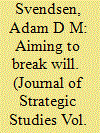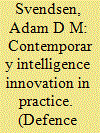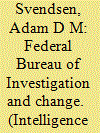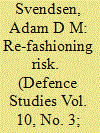|
|
|
Sort Order |
|
|
|
Items / Page
|
|
|
|
|
|
|
| Srl | Item |
| 1 |
ID:
096544


|
|
|
|
|
| Publication |
2010.
|
| Summary/Abstract |
Current US Air Force doctrine emphasizes attacking an enemy's 'will to resist' without defining 'will'. Much of the Air Force's focus on will stems from prewar bombing doctrine and America's initial effort to break an enemy's morale with bombs - the aerial assault on Nazi Germany. That bombing revealed that a nation-state's will to resist actually consists of three distinctive elements - the will of its populace, government leaders, and the armed forces - which together form a collective desire to fight. The bombing also showed that the resilience of the individual components depends on the strength of the bonds that connect them and the war aims pursued by all belligerents. It further illustrated that the individual element most likely to break from air attack is the will of the armed forces.
|
|
|
|
|
|
|
|
|
|
|
|
|
|
|
|
| 2 |
ID:
139206


|
|
|
|
|
| Summary/Abstract |
Currently, “macro” systems thinking is arguably most evident in intelligence studies. Appearing especially apparent are characterisations of different intelligence architectures, strongly associated with grander-ranging national or central intelligence systems and their associated machinery, even being bounded as intelligence communities. Following on from noteworthy US defence sector developments, which have demonstrable relevance both to and for closely overlapping contemporary intelligence work, more “micro” systems thinking – namely involving intelligence-related “System of Systems” (“SoS”) concepts – is increasingly emergent. For helping to facilitate and better understand contemporary intelligence innovation, SoS constructs and their dynamics are now deserving of being further examined and refined. This includes as they pertain to the conduct of several multifunctional and special operations occurring across the world during an overall era of globalised strategic risk, and as the study and practice of intelligence aims towards further extension and adaptive transformation.
|
|
|
|
|
|
|
|
|
|
|
|
|
|
|
|
| 3 |
ID:
145311


|
|
|
|
|
| Summary/Abstract |
The summer of 2015 heralded the beginning of “Year Two” of the U.S.-led international coalition's airstrikes against Islamic State (IS)—also known interchangeably as the Islamic State of Iraq and al-Sham or Syria (ISIS), Islamic State of Iraq and the Levant (ISIL), and Da'esh. So far to date, the results of the campaign—indeed, what can be termed the campaigns that have been witnessed—against IS are hugely mixed. A highly complex, gradual, long-term approach is clearly underway and is expected to continue on that trajectory into the foreseeable future. Much patience requires sustained maintenance.
|
|
|
|
|
|
|
|
|
|
|
|
|
|
|
|
| 4 |
ID:
116160


|
|
|
|
|
| Publication |
2012.
|
| Summary/Abstract |
In this article, shortcomings with US domestic counter-terrorism intelligence and associated efforts since 2000 are analysed. Potential suggestions for the extended development of the Federal Bureau of Investigation (FBI) are then discussed. Some of these propositions touch on developments involving the domestic intelligence and security services of other countries, and explore their use concerning the future optimization of the FBI in the area of domestic counter-terrorism intelligence. Within the overall culture and operational approach of the FBI, today greater sustained emphasis still needs to be accorded to the 'intelligence methodology' of 'wait and watch'. Simultaneously, the FBI needs to keep moving more from mainly a post facto emphasis to more of an a priori one in its investigations. Thereby, the FBI can continue to move towards improved delivery and better meet its role as a guarantor of US national security in a timely manner as the twenty-first century progresses.
|
|
|
|
|
|
|
|
|
|
|
|
|
|
|
|
| 5 |
ID:
114690


|
|
|
|
|
| Publication |
2012.
|
| Summary/Abstract |
Adopting the analytical framework of the established interpretive "schools" of Anglo-American relations, this article offers several reflections on UK-US defense relations as they occurred over the significant years of 2000-2005. During those years, trajectories were established on which UK-US defense relations continue to travel today and outcomes emerged which are still being navigated. This article concludes that the Latin phrase, "Flectas Non Frangas" (essentially translated as: "Bend not Break"), is the most appropriate to adopt to characterize the developments undergone in recent UK-US defense relations. Many historical and strategic lessons with contemporary relevance are drawn.
|
|
|
|
|
|
|
|
|
|
|
|
|
|
|
|
| 6 |
ID:
084735


|
|
|
| 7 |
ID:
095438


|
|
|
|
|
| Publication |
London, Routledge, 2010.
|
| Description |
xxi, 236p.
|
| Series |
Studies and intelligence series
|
| Standard Number |
9780415550406, hbk
|
|
|
|
|
|
|
|
|
|
|
|
Copies: C:1/I:0,R:0,Q:0
Circulation
| Accession# | Call# | Current Location | Status | Policy | Location |
| 054871 | 363.325163/SVE 054871 | Main | On Shelf | General | |
|
|
|
|
| 8 |
ID:
124004


|
|
|
|
|
| Publication |
2013.
|
| Summary/Abstract |
To enhance contemporary intelligence, more thinking should be aimed at turning research and knowledge into use. 1 The principle is that research work and its knowledge can readily be turned into a more purposeful and relevant contribution to overall intelligence activities. In both qualitative and quantitative terms, that research-originating contribution can be better applied in overarching "all-source" intelligence efforts.
|
|
|
|
|
|
|
|
|
|
|
|
|
|
|
|
| 9 |
ID:
099508


|
|
|
|
|
| Publication |
2010.
|
| Summary/Abstract |
his article explores the recent UK, US and Canadian security and intelligence efforts against terrorism. Contrasts can be readily drawn. Essentially the UK is engaged in both internal/domestic and external/international 'firefighting' against terrorism. Therefore, it has adopted a wide-ranging 'broad risk management' approach. Meanwhile the US is engaged mostly in external/international 'firefighting' against terrorism, conceived of as counter-insurgency in countries such as Iraq and Afghanistan. Washington has adopted a narrower 'risk prevention' approach. The Canadians, confronting a smaller threat, are less embroiled in 'firefighting' activities, enabling them to adopt more of a 'risk pre-emption' approach involving some social engineering. Arguably, the Canadian model outlined in this article can offer some instructive lessons for both the US and the UK.
|
|
|
|
|
|
|
|
|
|
|
|
|
|
|
|
| 10 |
ID:
096543


|
|
|
|
|
| Publication |
2010.
|
| Summary/Abstract |
This article examines 'disproportionality'. It begins by tabling some suggestions for how greater 'proportionality' can be attained and then maintained, particularly in international security operations. A process termed 'proportionalisation' is proposed. Lessons from 'traditional' strategic studies need to be re-asserted. This is so that some of the observed limitations with recent operations can be addressed. Losing sight of key objectives is unhelpful, not least when an essential clarity of focus and leadership is required. Today, a return to some classical notions is required to address the observed strategic vacuums, together with an improved intelligence methodology being needed. This article concludes by arguing that 'disproportionality' emerges when 'high politics' become increasingly disconnected and removed from their empirical bases and 'low politics'. Greater connection needs to be engendered. Otherwise, in the absence of proportionality, strategies will increasingly fail, command and control will falter, and the desired goal of 'operational success' will elude us.
|
|
|
|
|
|
|
|
|
|
|
|
|
|
|
|
|
|
|
|
|